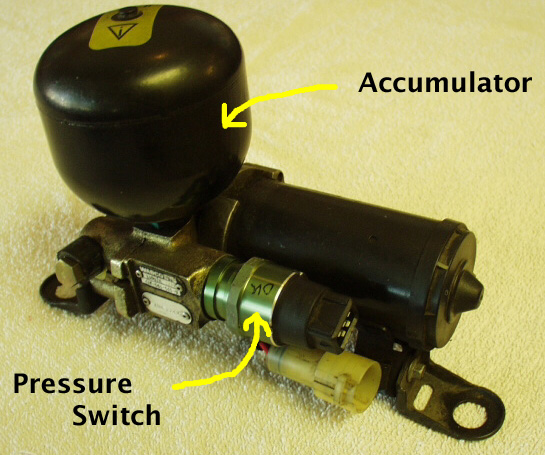New, Used, Rebuilt ... which way to go???
We are Land Rover specialty repair shop and we repair and overhaul Range Rover WABCO brake pumps. We thought it would be nice to share some of what we see out there. So here are some Important Buying tips, one of the very few things that our Range Rover ABS Bible, Getting Comfortable with WABCO ABS brakes, Range Rover 1990 to 2002, eighth edition, does NOT INCLUDE. Prices and information cited are approximations, current summer 2025.
 In order to decide whether to buy a new, rebuilt or refurbished,
or even a used pump, it is important to consider that the Pump Assembly
consists of four main parts. A great deal of confusion surrounds
these terms. This is made worse by the fact that 90-95 Ranger
Rover Classics
use
a different configuration. Use the tab above for the
Classic page if your brake pump doesn't look like the one shown
here. BTW, in 1995 both Classic and P38 model Rage Rover
were sold.
In order to decide whether to buy a new, rebuilt or refurbished,
or even a used pump, it is important to consider that the Pump Assembly
consists of four main parts. A great deal of confusion surrounds
these terms. This is made worse by the fact that 90-95 Ranger
Rover Classics
use
a different configuration. Use the tab above for the
Classic page if your brake pump doesn't look like the one shown
here. BTW, in 1995 both Classic and P38 model Rage Rover
were sold.
-- MOTOR
-- PUMP BODY
-- ACCUMULATOR
-- PRESSURE SWITCH
Motor: The original ones can be repaired. The new-production Chinese repro motors are junk; we will not even offer to fix them in our shop. Detailed explanation of motor repair here.
Pump Body: Most pump body failures in P38a are from a faulty check valve. If this is the case it is most cost-effective to replace the body with a good used body. If the check valve is good but the pump doesn't make pressure or is noisy, this can be repaired.
Accumulator: This is a wear item. Never would a used accumulator ever be of any interest!! They only last about five years. We have a test-position for them, and can bench-test them for about $60, but there is no good external way to tell their condition so any used one is a huge gamble, plain and simple. Worse still, used accumulators will contain contaminants -- including bodily fluids from the donor, as well as their own deteriorated rubber guts -- which, if installed, will be introduced into your truck's brake system immediately, likely causing new damage and new issues. There is no method for cleaning used accumulators: best to think of them as similar to used condoms ... sorry. They have in them whatever the last brake system they were used upon had in them: yuk!
The Range Rover Brake Book explains the details of how the accumulator is built, tested by the user, how it affects the life expectancy of the pump, and how it fails. Regardless, WABCO has never sold license to manufacture this part to anyone else, so whomever you buy a new one from, it is the exact same part.
Pressure Switch: These control the pump's operation cycles. They can be changed separately (36mm thin-wall deep socket). Often, when they fail, the mechanic deems the entire pump bad. But the switch does not fail with any regularity. It can be an issue, randomly, from time to time: some last hundreds of thousands of miles while others puke sooner. As with any mechanical condition, use hastens their demise, and the worse the accumulator, the more the use-cycles on the switch.
A new pressure switch has never been available from Land Rover. We usually do have new genuine WABCO switches on hand for around $200.
We can bench-test your old pump, accumulator, pressure switch, or that thing you bought on eBay. Just send it in. $59 to test & estimate repairs, if any.
New pump assemblies are NLS since 2015.
Rebuilt or repaired pumps, without new switch and accumulator work as well and will last as long as new ones; new ones were much more attractive, but we can do cosmetic restoration as well, if you like.
Used pump assemblies, if they come with switch and accumulator, do require throwing away the accumulator. The main reason to buy a used one is if the motor on your old one is totally fried: it may be cheaper to steal a good motor off a used unit than to fix yours, and certainly smarter than buying a new reproduction pump motor!
REMEMBER: Pump faults (not accumulator or switch faults) are almost always caused by other things, relays, blocked filters, things which our Range Rover ABS Brake Book explains in detail ... so that the owner can tell well in advance. Please don't mix brake fluids, and stay on top of accumulators, fluid, filters, and relays. And if you read the book and there's almost no reason to ever need to buy another pump! Just Sayin' ...